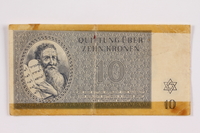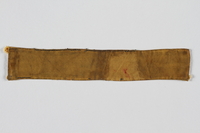Overview
- Description
- Testimony, various versions, typescript, 5 pages each, plus photocopied passport.
Physical Details
- Language
- English
- Genre/Form
- Personal Narratives.
- Extent
-
1 folder
Rights & Restrictions
- Conditions on Access
- There are no known restrictions on access to this material.
- Conditions on Use
- The donor, source institution, or a third party has asserted copyright over some or all of these material(s). The Museum does not own the copyright for the material and does not have authority to authorize use. For permission, please contact the rights holder(s).
Administrative Notes
- Holder of Originals
-
United States Holocaust Memorial Museum
- Legal Status
- Permanent Collection
- Provenance
- The United States Holocaust Memorial Museum Art and Artifacts Branch transferred the revised copy of Gisela Zamora's memoir to the Archives in July 1999.
- Record last modified:
- 2023-02-24 13:49:30
- This page:
- https://collections.ushmm.org/search/catalog/irn500754
Download & Licensing
- In Copyright
- Terms of Use
- This record is not digitized and cannot be downloaded online.
In-Person Research
- Request 7 Days in Advance of Visit
- Plan a Research Visit
-
Request in Shapell Center Reading Room
Bowie, MD
Contact Us
Also in Gisela E. Zamora collection
The collection consists of artifacts and documents relating to the experiences of Gisela Eckstein as an inmate of the Theresienstadt ghetto and Maerzdorf slave labor camp and of Joseph Zamoire (Zamora) as an inmate of Auschwitz concentration camp during the Holocaust. Some of these materials may be combined into a single collection in the future.
Date: 1943-1945 June

Theresienstadt ghetto-labor camp scrip, 10 kronen note, acquired by a former inmate
Object
Theresienstadt scrip for 10 kronen given to Gisela Eckstein, a former inmate of the camp by another former inmate. Currency was confiscated upon entry and scrip was distributed per a 5-tier rating based on status or employment or received for conscript labor while in camp. Gisela, age 14, her parents, Berthold and Bertha, and her brother Norbert, age 12, were deported from Battenberg, Germany, to Ghetto Theresienstadt in September 1942. The family was transported in August 1944 to Auschwitz concentration camp where Gisela was separated from them and sent to Birkenau concentration camp. In October, she was shipped to Maerzdorf where she worked as slave labor in a linen factory. The camp was liberated by Soviet troops on May 8, 1945. Gisela was hospitalized for many months after the war. She had no surviving relatives in Europe, but a maternal uncle was discovered in the US. She emigrated to New York in March 1947.

Yellow cloth strip sewn to a slave laborer's uniform to identify her as a Jew
Object
Yellow strip of cloth from the uniform worn by 16 year old Gisela Zamora when she was a slave laborer at Maerzdorf concentration camp from October 1944 to May 1945. The strip was sewn to the back of her uniform to identify her as a Jew. It may have had a red triangle painted on it. Gisela, her parents, Berthold and Bertha, and her brother Norbert, age 12, were deported from Battenberg, Germany, to Ghetto Theresienstadt in September 1942. The family was transported in August 1944 to Auschwitz concentration camp where Gisela was separated from them and sent to Birkenau. In October, she was shipped to Maerzdorf where she worked as slave labor in a linen factory. The camp was liberated by Soviet troops on May 8, 1945. Gisela was hospitalized for many months after the war. She had no surviving relatives in Europe, but a maternal uncle was discovered in the US. She emigrated to New York in March 1947.
Josep Zamojre papers
Document
Consists of passports issued by the German government to Joseph Zamora, the donor's husband, and to his father that allowed for the two men to travel to Italy where they hoped to find safety, dated 14 Feb.1940; and a group of documents, including ID cards from Italy, belonging to the donor's husband. Joseph Zamora was captured in Italy and deported to Auschwitz; he was on the same transport as Pri.
Gisela Zamora papers
Document
The papers consist of a copy of a document issued to Guiseppe (Joseph) Zamoire, husband of Gisela Zamora, stating that he was a prisoner in Auschwitz and a pass issued to Gisela Eckstein [donor] when she was returning from a concentration camp giving her permission to pass through the town of Zgorzelice (Görlitz), Germany, and cross the bridge in Friedberg, Germany, along with two men.



